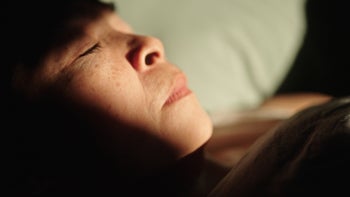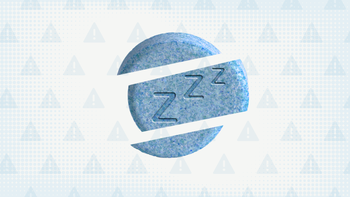
Doxylamine vs. Diphenhydramine for Sleep: 4 Differences You Need to Know
Key takeaways:
Both doxylamine (Unisom) and diphenhydramine (Benadryl, ZzzQuil) can be used for short-term sleep problems for up to 2 weeks. They work similarly and they have similar side effects.
Doxylamine stays in your system longer than diphenhydramine. So it may be more likely to cause next-day drowsiness.
Diphenhydramine can be used for allergies as well as for sleep. But be sure to read the package instructions carefully, since the directions for use are different.
Doxylamine and diphenhydramine are available over the counter as brand-name medications. But you can also find them as lower-cost generics. If your healthcare provider writes you a prescription for doxylamine or diphenhydramine, GoodRx can help save you money.
Access savings on related medications
Table of contents
Looking for an over-the-counter (OTC) medication to help you sleep? You might find yourself choosing between doxylamine or diphenhydramine. Many popular OTC sleep aid brands, including the ZzzQuil and Unisom lines, contain one or the other of these medications.
Doxylamine and diphenhydramine are both first-generation antihistamines. These older antihistamines can be taken to treat allergies. But they tend to cause a lot of drowsiness. So much drowsiness, in fact, that they’re sometimes also taken as sleep aids.
But which one should you take for sleep? Although doxylamine and diphenhydramine are similar, there are four key differences you should know about. Knowing these can help you make the decision that’s right for you.
Search and compare options
1. Doxylamine might cause more next-day drowsiness
Both doxylamine and diphenhydramine can cause drowsiness the next day. But doxylamine stays in your system longer. After taking doxylamine, it takes the body roughly 10 hours to clear half the dose (its half-life). For older adults, this time may increase up to 15 hours. For diphenhydramine, it takes the body less time to get rid of half your dose — roughly 3 to 9 hours.
This means you may feel the intended effects of doxylamine for a bit longer than diphenhydramine. But this also means you may experience side effects, such as lingering drowsiness, longer. So you may be more likely to experience next-day drowsiness with doxylamine.
Before taking any sleep aid, it’s important to plan on getting a full night’s sleep. For most adults, that’s about 7 to 9 hours. But keep in mind that even with a full night’s sleep, it may not be enough time for the effects of doxylamine or diphenhydramine to completely wear off.
2. Diphenhydramine is usually taken at higher doses
When purchasing doxylamine or diphenhydramine as OTC sleep aids, you’ll notice there’s a difference in dosing. The usual dose of doxylamine is 25 mg, taken 30 minutes before bedtime. The typical dose for diphenhydramine for sleep is 50 mg, taken 30 minutes before bedtime.
These doses should provide similar effects. So even though the number of milligrams is different for doxylamine and diphenhydramine, they’re considered similar in potency. Be careful not to take more than the doses recommended on the OTC label for your product.
Doxylamine is given as a lower dose because its effects last longer in the body. You shouldn’t take more than 25 mg of doxylamine at one time unless a healthcare provider has told you to do so.
If you’re feeling unsure about how doxylamine or diphenhydramine will affect you, you can try a lower dose. Some diphenhydramine products come as a dose of two 25 mg pills. This gives you the option of taking just one pill instead of two. There’s also the option to a smaller amount of liquid than what’s suggested on the label.
You can also check with your pharmacist to see if it’s OK to cut doxylamine or diphenhydramine tablets in half. Just be aware that while these strategies can help limit side effects, it may also make the medications less effective for sleep.
3. Diphenhydramine can be used for allergies
It’s possible that seasonal allergy symptoms are keeping you awake at night. Taking an antihistamine is one treatment option for this. Both doxylamine and diphenhydramine are antihistamines that can help relieve allergy symptoms. But only diphenhydramine provides dosages for allergies on its OTC labeling.
Be sure to read diphenhydramine packages carefully. Depending on how it’s marketed, some packages may have dosing only for sleep or only for allergies. And the dosage for allergies is different than what’s recommended for sleep.
Talk to your pharmacist if you don’t see a dose listed for the reason you’re taking it. And it’s best to ask your healthcare provider before taking doxylamine for allergies. If they feel this is the right allergy treatment for you, they can provide an appropriate dosage for this use.
4. Doxylamine is more likely to be in cough and cold products
Sometimes it feels impossible to sleep with a cold or the flu. But before you purchase a sleep aid, check the label to see what’s in the OTC cough and cold medications you’re taking. Often, you’ll find doxylamine.
Although doxylamine or diphenhydramine can be included in cough and cold products, doxylamine is more common. You can find it in many popular OTC combination products, including certain NyQuil products. Usually, these products are labeled for nighttime relief, but not always.
Talk to your pharmacist if you’re having trouble sleeping because of a cold or flu. They can recommend an OTC cough and cold medicine that can also help you get a good night's rest. Be careful when combining OTC products, even if one is for sleep and the other is for cold symptoms. Many have similar or overlapping ingredients (besides doxylamine) that could lead to an accidental overdose.
How do you pick between doxylamine and diphenhydramine?
Doxylamine and diphenhydramine can both be used for occasional insomnia. They work similarly and have comparable side effects. The best choice usually comes down to personal preference. But there are still some things to keep in mind.
You may want to consider diphenhydramine when:
You’re worried about next-day drowsiness (but remember, diphenhydramine may also cause this side effect).
You also want to treat allergy symptoms.
Doxylamine might be the better choice for you if:
You feel like diphenhydramine wears off during the night.
You’re looking for a nighttime OTC cough and cold product (just don’t take any sleep aids in addition to these combination products).
When should you stop taking doxylamine or diphenhydramine?
Doxylamine and diphenhydramine are both intended for short-term use. You shouldn’t take them for longer than 2 weeks at a time without talking to a healthcare provider. Be aware that many experts don’t recommend antihistamines for treating insomnia, especially when taken long term. There isn’t a lot of good evidence that they work for chronic sleep problems.
Who shouldn’t take doxylamine or diphenhydramine?
When taken for sleep, doxylamine and diphenhydramine are intended for adults and adolescents ages 12 years and older. They should be avoided in people 65 years and older. Older adults may have a higher risk of confusion, falls, and other side effects with first-generation antihistamines.
Talk to your healthcare provider before taking doxylamine or diphenhydramine if you:
Are looking for a sleep aid for a child under 12
Are 65 years or older
Have trouble urinating because of an enlarged prostate
Have glaucoma
Have breathing problems such as emphysema or chronic bronchitis
Take other antihistamines, including topical diphenhydramine (e.g., creams, gels)
Take other sleep aids or medications that cause drowsiness
Make sure you have time for a full night’s sleep before taking either doxylamine or diphenhydramine. And avoid drinking alcohol. Remember to use caution the next morning before trying to drive — you may feel groggy.
How to save on doxylamine or diphenhydramine
There are ways to save on doxylamine or diphenhydramine, which are available as brand-name and generic medications. By having your provider write a prescription for doxylamine or diphenhydramine, GoodRx can help you save over 50% off the average retail price.
The price of generic doxylamine at certain pharmacies may cost as low as $4.86 with a free GoodRx discount. The price of generic diphenhydramine at certain pharmacies may cost as low as $1.20 with a free GoodRx discount.
The bottom line
Choosing between doxylamine and diphenhydramine can be tricky. Both medications can be helpful for short-term sleep problems, and they have similar side effects. But doxylamine may be more likely to cause next-day drowsiness. Diphenhydramine is commonly marketed for allergies, whereas doxylamine is more often included in nighttime cold medications.
Neither doxylamine nor diphenhydramine is recommended for sleep in kids under 12 or adults ages 65 and older. Be sure to read the label for your product carefully. Both medications are found in a number of OTC medications. It can be easy to duplicate ingredients and take too much.
Why trust our experts?



References
2023 American Geriatrics Society Beers Criteria Update Panel. (2023). American Geriatrics Society 2023 updated AGS Beers Criteria® for potentially inappropriate medication use in older adults. Journal of the American Geriatrics Society.
Brott., N. R., et al. (2022). Doxylamine. StatPearls.
Chattem, Inc. (2023). Unisom sleeptabs- doxylamine succinate tablet [package insert]. DailyMed.
DailyMed. (n.d.). Unisom.
DailyMed. (n.d.). ZzzQuil.
Sateia, M. J., et al. (2017). Clinical practice guideline for the pharmacologic treatment of chronic insomnia in adults: An American Academy of Sleep Medicine clinical practice guideline. Journal of Clinical Sleep Medicine.
Sicari, V., et al. (2022). Diphenhydramine. StatPearls.
The Procter & Gamble Manufacturing Company. (2023). ZzzQuil Nighttime Sleep-Aid- diphenhydramine hydrochloride capsule, gelatin coated [package insert]. DailyMed.

























